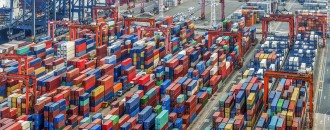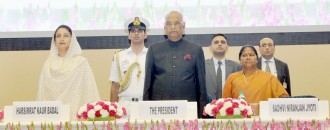
Our technology will differentiate us from other logistics providers: Shipwaves
Deepak Kumar
Shipwaves is an end-to-end online logistics platform catering to the needs of importers and exporters from India. Headed by Capt. Vikram Mathur, CEO a seasoned veteran in the shipping industry who has over 27 years of rich experience in logistics, supply chain and business strategy in various corporates along with two young dynamic co-founders Athahar Mohammed and Shahid Israr, Shipwaves has firmly anchored itself in the logistics business in India. The Dollar Business correspondent met Athahar Mohammed to know more about the company and the state of logistics industry in India.
The Dollar Business Bureau (TDB): How did the idea of starting a logistics supply chain company come to your mind?
Athahar Mohammed (AM): One of the co-founders had a personal experience in dealing with freight forwarders. The frustration of endlessly waiting for quotes for shipments, lack of transparency in rates quoted and the inability to compare rates for the same shipment led us to create a shared technology platform for shippers. Shipwaves strives to empower shippers, bring freight forwarders closer to assured business and continued customer relationships, and an overall accountability for final delivery through the same common platform. This is the first step towards easing the process of ocean trade for the vast SME sector in India.
TDB: India’s logistics industry has always had a tough time operating amid the country’s not-so-well-developed infrastructure. Do you also see this as a challenge or an opportunity? Have we made any progress on this front?
AM: We believe that it is high time that the logistics industry got streamlined with the help of technology. Other sectors have leveraged technology to make the processes easier and automated, reducing time and costs for each transaction. This must now happen with logistics as well. Worldwide, this is a segment of high interest and action, both by the number of companies launched and funding received.
We are bringing together the stakeholders of this industry to create an online ecosystem. Providing transparency and comparative rates for freight is the first step in this direction.
TDB: How do you plan to tackle challenges and competition from the country’s bigger logistics companies, considering that your company is relatively new? How do you plan to make yourself standout?
AM: Our technology will differentiate us from other logistics providers. We will scale up much faster to reach the critical mass. We have inducted senior members in our team who bring a wealth of experience from this industry. We have already handled 1000 container shipments last year. We plan to double this target this year. We have had early successes with shippers from diverse verticals like seafood, cement, machinery etc. End to end services support and accountability for delivery will be the hallmark of shipping with Shipwaves.
TDB: Do you receive adequate support from the Central and the State Government? What kind of support do you need from them? How has been your experience dealing with the government agencies?
AM: Government has a much larger modernization agenda on hand to facilitate ocean trade. We believe that automation of logistics will be a great enabler for the Government initiatives.
TDB: On the one hand where the logistics industry has been growing rapidly, thereby generating more number of economic opportunities as well as employment opportunities, there have been predictions that robots will take over a significant percentage of the jobs in this industry. Do you see that happening?
AM: There are two types of services in the logistics industry. One, movement of cargo over land, ocean and air. There are automated trucks, and robots to move cargo within the port and load in the ship, being tested out in western countries, but full-fledged implementation will probably happen in the mid to distant future. The other service which needs skilled manpower to negotiate the complexities of the trade like optimising the cost of supply chain, logistics and customs paperwork - some of them are moving online. With new trends of millennials, mobile and cloud services, Shipwaves is in a unique position to assist the industry to embrace the change. Trust and services is a major factor in this business and we are helping the shippers in the transformation of the conventional practices.
TDB: What do you mean when you say that you provide customised supply chain solutions to customers worldwide?
AM: With our internal software and big data analysis, we have a huge amount of data patterns to suggest and advise our users over the entire supply chain - starting from the storage of cargo, land transport routes, port congestions, customs rules, shipping lines to choose, etc. We counsel our customers on their logistical needs with our industry expertise, transparency with multiple options provided to them, to bring about efficiency in costs and overall supply chain management.
TDB: Who and where are your customers? How do you make new ones, how do you target them? Is there a set marketing plan that you have adopted?
AM: Since launch, our customer acquisition has been driven through personal contacts and testimonials. Going forward, we will be presenting our case, white papers etc at industry platforms and continue to build visibility through other trade channels.
TDB: How adaptable have you been with the government’s new initiatives, such as Make in India and Ease of doing business? The Prime Minister has always emphasised on lessening the amount of paperwork. Do you also consider this mantra as something to relate to? How do you deal with your customers in terms of providing them flexibility, transparency and less amount of paperwork?
AM: We are very upbeat about the PM’s initiatives and the support to ocean trade. We cannot do away with paperwork completely but we can leverage technology to reduce it. For example, recently the Govt of India issued a notification* to all ports to implement paperless customs, with reduced documentation etc. The Govt of India is also investing in modernising the port infrastructure with technological upgrades. We are in the right space at the right time.
At the same time being a technological platform for multiple service providers, we provide the single source of information/documentation to all stakeholders, which brings in transparency, accuracy of information and speed of information dissemination.
TDB: Where are your major clientele based? What countries have you been already operational in, and what new markets and clients are you targeting? Where do you see yourself soon?
AM: We have a strong operational presence in all major ports of India, because of which we can handle shipments of shippers originating from various geographical locations in India - Ludhiana, Ahmedabad, Pune, Mumbai, Mangalore, Chennai, Hyderabad and some from very remote locations in India as well. Since our model and platform is scalable, we have global ambitions in the coming years.
TDB: GST is said to have brought new waves of hope for the country’s logistics industry. Please share your expectations from GST? Are you happy with the rates, the amount of progress made on its implementation? Are you technologically ready for its implementation?
AM: Our industry will have certain implications overall. We will wait and watch.
TDB: How has the demonetisation of Rs.1000 and Rs.500 notes impacted India’s logistics industry? Have you witnessed any slowdown? What do you envisage in future? Do you think it is a good move? Could the government have taken the same step differently or not taken at all?
AM: Electronic transactions will do the country a great deal of benefit. Interim inconvenience is inevitable with any major change in behaviour. It will prevent leakages from the system.
TDB: How has Make in India impacted the industry? Is there any impact at all? Has India been able to bring a significant number of foreign investors in the logistics sector? What is the scope for SMEs in this sector?
AM: It is too soon to talk about it but one is witnessing traction in the SME sector following policy changes and ease of doing business. But the complete transformation of the system will take time as the administrative machinery of Government has got used to of working in a certain manner for several decades now.
TDB: India spends about 13% of its GDP on the logistics industry. Yet the sector has not seen enough progress over the years? What is lacking, and why?
AM: Highly fragmented industry; multiple agencies for coordination; heavy paperwork; slow adoption of technology; thriving middlemen: all adding to the cost of shipment and finally the cost of goods. We are working to change this.
TDB: How will digital India impact the industry? There have been talks of mobile technology, Internet of Things (IoT) and cloud services bringing a paradigm shift in the supply chain management (SCM). What is your take on that?
AM: IoT will help in tracking and accountability of the goods. But for the logistics industry, the major issues have been much bigger. Access to information, transparency, productivity lost with paperwork etc have been bigger issues. The Cloud services along with the Govt of India initiatives on Digital India will help even the smallest of the exporters, far away from the port to have access to the same information. This will drive the change for the ocean logistics industry.
TDB: The Ministry of Shipping has emphasised on developing India’s coastline. We assume you see this as an economic opportunity, do you also see this as an economic challenge, considering various newly-built airports do not see register any activity?
AM: The idea of developing coastline was to transport the road cargo via coastal line, reduce the land transportation costs, reduce road congestion, reduce pollution and develop new economic opportunities for the shipping industry. This is just the beginning, but the Ministry of Shipping is making all efforts to bring in new policies, benefits for the cargo owners to operate using the coastal lines.






 to success.
to success.